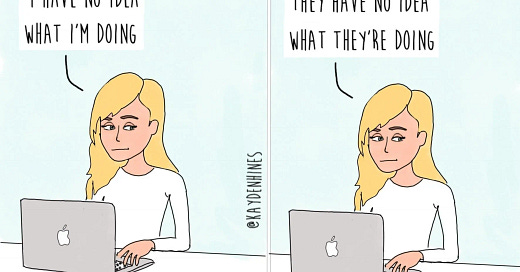Ten things to do in your first few weeks of a new job
Compiled over time with advice from my friends and my own experiences
Ideally, your company has good structure around onboarding and a lot of these items will be set up for you. However, in reality, that’s not always the case – particularly if you’re joining a younger/smaller/less mature company.
As you read this, please click ❤️ above if you find this useful! This helps get my content to more readers on the big internet.
Here’s the list of what I’d do to make my onboarding as smooth and productive as possible:
Schedule recurring time with your manager. I’d have at least a weekly 1:1 if not extra time. When asking for extra time, I like to schedule it on an ad hoc basis as specific questions/topics come up so there is a clear agenda. As part of regular 1:1s, work towards a 30/60/90 day plan and make sure to get feedback on progress as the weeks go by.
Take notes and bookmark everything. There’s usually a lot of information thrown at you in the first few weeks at a new job and oftentimes, everything feels useful but you don’t quite know how or where you’ll apply it yet. Take notes, keep links to useful docs, and generally just create a paper trail. Later on, when you have an inkling that you’ve seen something relevant, this makes it a little easier to search in your notes archive for the tidbit of information.
Write all your questions down and review them periodically. Sometimes I end up answering my own questions in due time, and other times I realize certain questions are somewhat unanswerable – i.e., everyone else is trying to solve that question too and it’s not something that can simply be explained in a matter of minutes. Any questions that don’t get filtered out into those two categories proceed to either my 1:1 document with my manager or into a running list that I ask other coworkers.
Related, find the friendlies – thank you Deena for this tip and the wording (I love how it sounds). For some really silly questions, having a friendly colleague or two is particularly helpful. I can easily Slack them on the side during a meeting to get a quick explanation or grab 5-10 minutes with them later to get some prickly context shared live. These friendly colleagues are incredibly helpful for learning institutional knowledge and other workplace tips and tricks that can be hard to glean from formal check-ins with a manager.
Ask about shadow expectations. Every place has these but it’s not always evident what they are early on. They’re sometimes so deeply internalized that it’s skipped over in onboarding. I’d recommend asking this to anyone and everyone – it can be super thought provoking and lead to a lot of deeper learning about the unique culture of a place fairly quickly.
Be patient on “feeling productive.” Most of us will be itching to jump into doing things, operationalizing cool new ideas, and most importantly, having output. However, depending on the situation, it can be a lot better to take more time to onboard properly, get to know more people (more deeply), ask questions, understand the local ways of working, and really dig deeper into the goal of your work before you just start executing. If in doubt, ask your manager about the expectations.
Set up your benefits. This takes surprisingly long every time. It’s easy to procrastinate on it but so many things can balloon into more of a hassle if left undone (for example, going to the dentist suddenly becomes a headache of figuring out insurance coverage instead of the already troublesome hurdle of having to book an appointment). In the lulls of onboarding, take advantage and get this stuff done and out of the way.
Share rough drafts. This always matters – it’s infinitely more efficient to share a work-in-progress, confirm alignment quickly or get course correction, edit, and then present a 80-90% product versus getting to 80-90% only to be told you’re really far off course. However, in the early days, the “right” direction can be quite ambiguous and getting feedback on rough drafts is invaluable for avoiding yield loss. I like to share work-in-progress with context like this: “My goal is to [XYZ] and here’s what I’ve laid out so far. How does this look compared to what you’re thinking?” I might call out specific parts where I’m more confused and ask for extra clarification on those as well.
Find a few quick wins. Once you start to have your bearings, identify a couple of quick wins – whether it’s really sticking the landing on that first small project you get or being an extra helpful cross-functional contributor to a bigger project – to demonstrate your abilities and highlight your strengths. This gives your manager and other leadership a chance to appreciate your progress and reinforces a good impression early on.
(If you're managing a team…) Understand the details of what your team does early on and even do them yourself at first. Rolling up your sleeves and getting your hands dirty builds credibility and empathy for your team. It gives you a much deeper understanding of the business and it’s much easier to start in the weeds than to try to get into them later on.
For those of you who’ve switched jobs recently, what else do you do? Drop a comment below to let us know!


